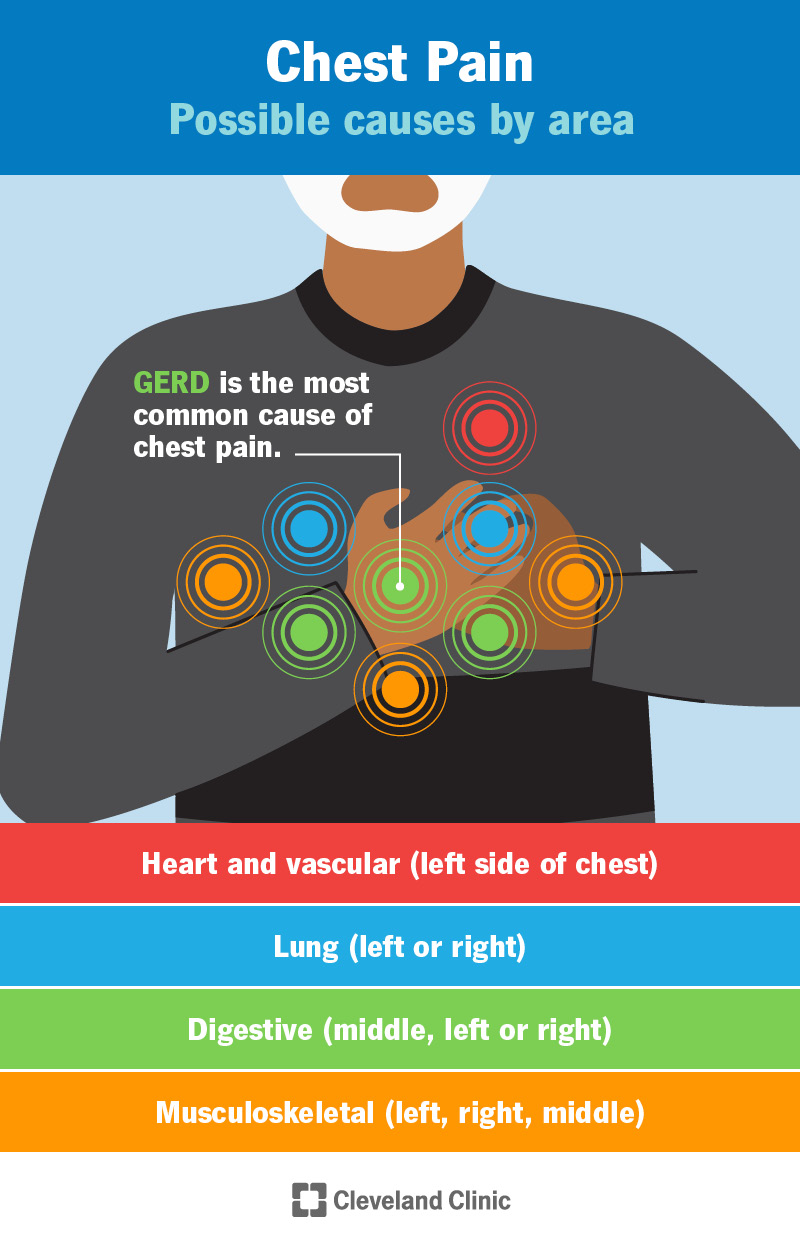Chest pain has many causes, like issues in your heart, lungs or digestive system. Some causes are life-threatening while others aren’t. A healthcare provider can find the cause of your chest pain and put your mind at ease. Chest pain treatments may include medicines or operations.
Advertisement
Cleveland Clinic is a non-profit academic medical center. Advertising on our site helps support our mission. We do not endorse non-Cleveland Clinic products or services. Policy
Video content: This video is available to watch online.
View video online (https://cdnapisec.kaltura.com/p/2207941/sp/220794100/playManifest/entryId/1_f9r897na/flavorId/1_5f3sgelj/format/url/protocol/https/a.mp4)
A heart attack often brings an unrelenting sensation of pressure, heaviness or tightness to your chest.
Chest pain is a pain or discomfort in any area of your chest. It may spread to other areas of your upper body, including down your arms or into your neck or jaw. Chest pains can be sharp or dull. You may feel tightness or achiness. Or you may feel like something is crushing or squeezing your chest.
Advertisement
Cleveland Clinic is a non-profit academic medical center. Advertising on our site helps support our mission. We do not endorse non-Cleveland Clinic products or services. Policy
Pain in your chest can last for a few minutes or hours. In some cases, it can last six months or longer. It often worsens during exertion and improves when you’re at rest. Or it may happen while you’re resting. It can feel like it’s in a specific area or a larger, more general one. You may have left-side chest pain, pain in the middle of your chest or right-side chest pain.
You should seek medical attention for chest pain in case it’s a heart attack or another life-threatening problem.
Healthcare providers see many people with chest pain. It’s a very common symptom. But it’s not always related to your heart.
Chest pain symptoms related to your heart feel like:
You also may feel:
Some of these symptoms also happen with lung issues that need immediate treatment.

Image content: This image is available to view online.
View image online (https://my.clevelandclinic.org/-/scassets/images/org/health/articles/21209-chest-pain)
Gastroesophageal reflux disease (GERD or chronic heartburn) is the most common cause of chest pain. Heart issue or not, you should get medical attention to get a diagnosis and the treatment you need.
Chest pains can come from heart, lung, digestive or other issues. They’re difficult to diagnose because they have so many causes. Healthcare providers start by looking for life-threatening causes first.
Advertisement
Chest pain causes include:
Chest pain treatment depends on the cause of the pain. If a heart attack is causing your chest pain, you’ll get emergency treatment as soon as you seek help. This can include medication and a procedure or surgery to restore blood flow to your heart.
If a noncardiac condition is causing your chest pains, your healthcare provider will talk to you about treatment options. Depending on your illness and how bad it is, they may recommend:
Some causes of chest pain can be life-threatening. This includes some lung-related causes of chest pain, too. The safe bet is to see a healthcare provider who can diagnose and treat your chest pain.
Yes. You can reduce your risk of heart, vascular and other diseases by following a healthy lifestyle. This includes:
To prevent some other causes of chest pain, you can:
Advertisement
If you have chest pain that lasts longer than five minutes and doesn’t go away when you rest or take medication, get immediate help. Call 911, your local emergency services number or have someone take you to the closest emergency room (ER) right away.
Cardiac chest pain can be life-threatening.
Chest pain can be a sign of a heart attack. Other signs of a heart attack include:
No. Chest pain isn’t normal. If you have chest pain, contact your healthcare provider or 911 right away.
Pay attention to any type of chest pain.
If your chest pain is new, comes on suddenly, or lasts longer than five minutes after you rest or take medication, call 911, your local emergency number or have someone take you to the closest emergency room.
Advertisement
If your chest pain goes away or comes and goes, see your healthcare provider as soon as possible to find out what’s causing the pain, even if it’s not severe.
Although most people think of a heart attack when they think of chest pain, there are many other conditions that cause chest pain. Know the signs of a heart attack and seek medical attention soon after you start having pain. Make a mental note of what you were doing when your chest pain happened so you can tell your healthcare provider. Being able to describe the kind of pain you’re having and where can help your provider give you a diagnosis.
Advertisement

Sign up for our Health Essentials emails for expert guidance on nutrition, fitness, sleep, skin care and more.
Learn more about the Health Library and our editorial process.
Cleveland Clinic’s health articles are based on evidence-backed information and review by medical professionals to ensure accuracy, reliability and up-to-date clinical standards.
Cleveland Clinic’s health articles are based on evidence-backed information and review by medical professionals to ensure accuracy, reliability and up-to-date clinical standards.
Whether you need stitches, a broken bone set or think your appendix might be causing your abdominal pain, Cleveland Clinic’s emergency medicine team is here to help.
